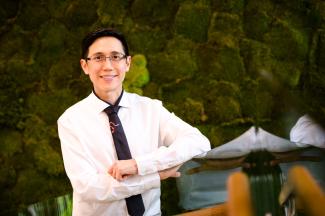
The Singapore Management University (SMU) joined the global Reach Alliance on 19 July 2022, committing to a partnership with leading global universities around the world, to translate actionable research insights into impact to communities and societies. The Alliance brings together multi-stakeholders, including researchers and practitioners from across disciplines and around the world, with a common purpose of accelerating the achievement of the UN’s Sustainable Development Goals.
Founded at the University of Toronto's Munk School of Global Affairs & Public Policy, in partnership with the Mastercard Center for Inclusive Growth, the Reach Alliance is a multi-disciplinary research and leadership initiative dedicated to investigating pathways to success with innovative programmes that can reach some of the world’s most marginalized populations.
"The Reach Alliance enables a global network of partner universities to collaborate on research and develop interdisciplinary solutions", says Professor Elvin Lim, Dean, College of Integrative Studies (CIS), SMU. “Through student research and faculty mentorship drawn from the Alliance, Singapore Management University aims to deepen our engagement with the city and to create meaningful impact for communities around the world.”
Over the course of the next four years, CIS will lead in the development of bespoke case studies that are characterised by elements of interdisciplinary and integrative learning, along with the University’s unique SMU-X pedagogy.
Established in May 2022 as SMU’s seventh and newest college, the CIS offers a bachelor’s degree programme in integrative and interdisciplinary education. “As the first of its kind in Singapore, the CIS’ Individualised Major will allow students to respond nimbly to industry and societal needs, by individualising their majors to engage with the needs of the future,” shared Prof Lim. “Students will be guided through a customised major that leverages their strengths and areas of interest.”
The CIS, which takes individualised learning to the next level, is a strategic element of SMU’s Vision 2025 of growing impact through transformative education. With an aim to nurture graduates who will find solutions beyond a single discipline or traditional paradigms and who will contribute to industry and society in impactful ways, the College holds a natural alchemy of strengths that makes it a natural fit to spearhead SMU’s participation in the Alliance.
With the addition of SMU, the University of Cape Town (South Africa), Ashesi University (Ghana) and the University of Melbourne (Australia) this year, the Alliance grows from four to eight major global universities. The original members of the Alliance are the University of Toronto (Canada), Tecnológico de Monterrey (Mexico), University College London (UK), and the University of Oxford (UK).
Scaling to SMU, the University of Cape Town, Ashesi University and the University of Melbourne will expand the scope and depth of Reach research, enhance the student researcher and faculty experience and accelerate the production of actionable insights about some of the world's most complex development issues.
"The work of the Reach Alliance can only be done by strengthening international partnerships to achieve global reach," says Marin MacLeod, Executive Director at the Reach Alliance.
To date, the Reach Alliance has produced 30 case studies spanning 20 countries. Actionable research insights have informed practitioners and policymakers – accelerating achievement of the Sustainable Development Goals and establishing the next generation of global leaders. Reach findings have been published in leading outlets, such as The Lancet, Stanford Social Innovation Review, WHO Bulletin, and BMJ Global Health.
"We are thrilled to welcome these top university partners to the Alliance and to learn from their unique and diverse perspectives. Their faculty and students will make a tremendous contribution to our global network of leading experts on how to reach the hardest to reach," said MacLeod.